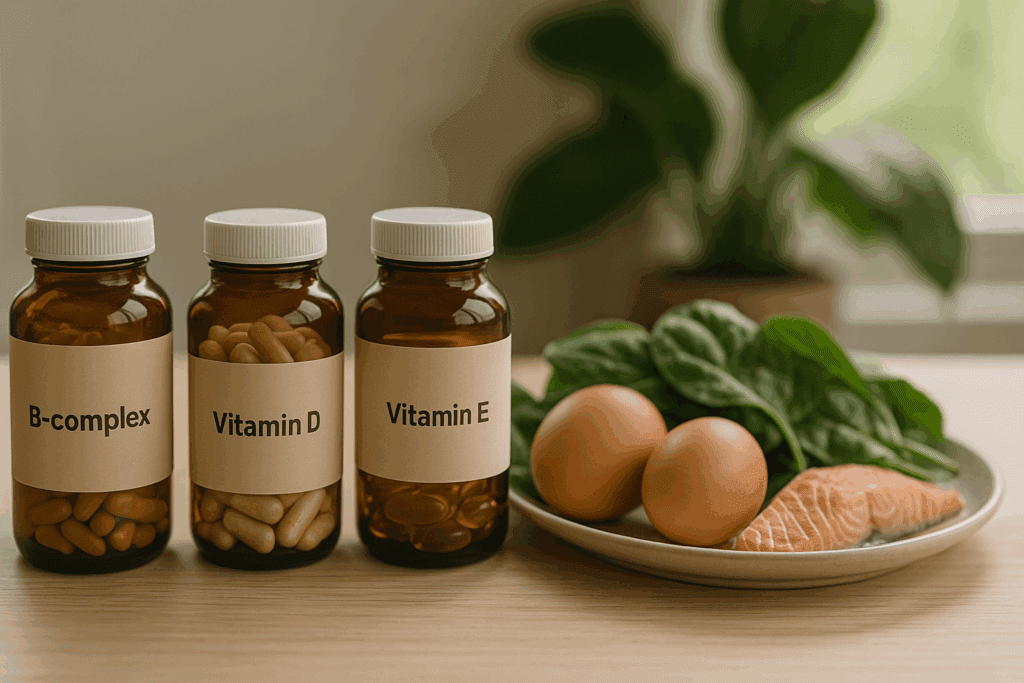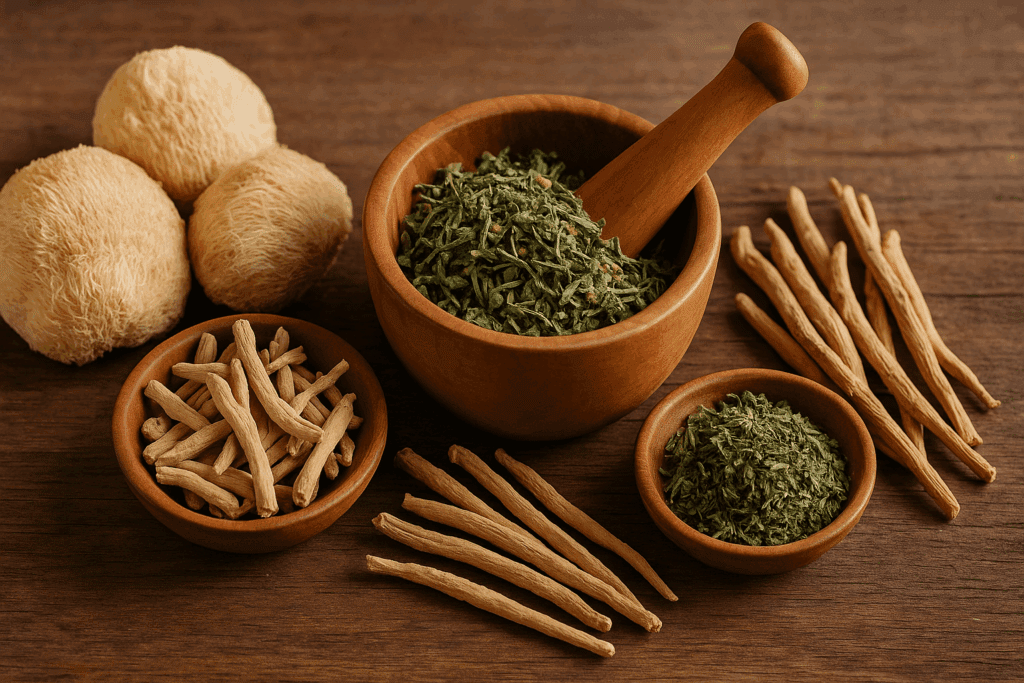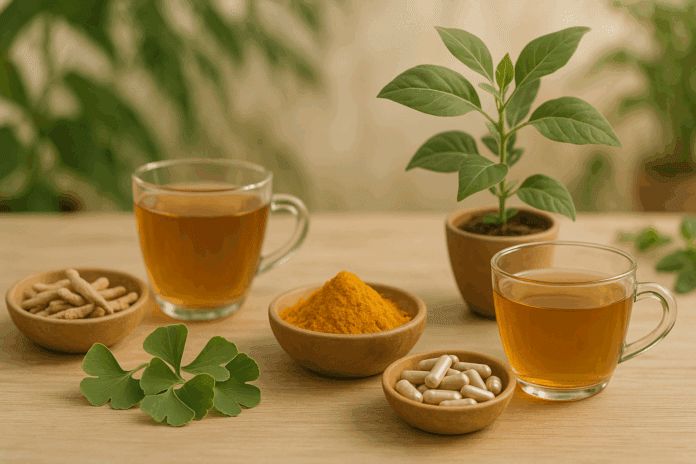Dementia, a complex and often progressive neurological condition, presents one of the most significant challenges in aging populations worldwide. While traditional medical interventions remain essential for diagnosis and management, a growing number of individuals are exploring complementary strategies to enhance cognitive resilience and quality of life. Among these approaches, natural remedies and supplements for dementia have garnered attention for their potential to support brain function, mitigate symptoms, and promote overall well-being. As scientific understanding of the brain evolves, so does interest in holistic treatment for dementia—a multidimensional path that incorporates nutritional, herbal, lifestyle, and mind-body strategies aimed at slowing cognitive decline naturally.
You may also like: How to Prevent Dementia and Alzheimer’s Disease Naturally: Expert-Backed Strategies to Reduce Your Risk Through Lifestyle and Diet
Understanding the Role of Natural Medicine for Dementia
Holistic medicine for dementia seeks to address not just the neurological symptoms but the whole person, taking into account emotional, physical, and social well-being. While no natural remedy for dementia patients can claim to be a cure, emerging research suggests that integrative approaches may complement standard treatments by promoting brain plasticity, reducing inflammation, and protecting against oxidative stress. Natural medicine for dementia often includes dietary changes, herbal support, stress reduction techniques, and targeted supplementation to fortify the body’s own defenses against neurodegeneration.
Practitioners of holistic medicine for dementia emphasize individualized care that considers genetic predispositions, environmental exposures, and lifestyle factors. This broader view allows for the integration of natural help for dementia with conventional therapies, providing a comprehensive and person-centered framework. By incorporating natural ways to treat dementia, caregivers and clinicians can foster a proactive mindset, where lifestyle modifications and evidence-informed remedies work synergistically to preserve cognitive function over time.

How to Slow Down Dementia Naturally Through Lifestyle and Diet
Among the most powerful tools in the fight against cognitive decline are everyday habits that influence brain health. Lifestyle interventions offer practical, non-invasive strategies for those wondering how to slow down dementia naturally. Regular physical activity, for instance, has been shown to enhance blood flow to the brain, stimulate the release of neuroprotective factors, and reduce risk factors such as hypertension and diabetes—both of which contribute to vascular dementia.
Equally critical is nutrition. Diets rich in antioxidants, omega-3 fatty acids, polyphenols, and fiber have been associated with reduced rates of cognitive impairment. The Mediterranean diet, in particular, provides a strong foundation, emphasizing fruits, vegetables, legumes, whole grains, nuts, and olive oil while minimizing processed foods and refined sugars. These dietary patterns align with natural remedies for dementia, as they target inflammation and oxidative damage, both implicated in the progression of neurodegeneration.
Stress reduction and sleep hygiene also play pivotal roles. Chronic stress increases cortisol levels, which can damage hippocampal neurons, while poor sleep impairs memory consolidation and toxin clearance in the brain. Mindfulness meditation, yoga, and breathing exercises offer effective ways to address these factors, serving as natural treatment for dementia by preserving emotional and physiological balance.

Exploring the Best Supplements for Dementia and Brain Function
Supplements for dementia continue to attract interest as adjunctive therapies, particularly those with anti-inflammatory, antioxidant, or neuroprotective properties. While the science behind these supplements is evolving, several compounds have shown promise in supporting brain health and slowing cognitive decline. Among the best supplements for dementia are omega-3 fatty acids, particularly DHA, which contribute to neuronal membrane integrity and synaptic function.
Phosphatidylserine, a phospholipid found in high concentrations in the brain, has demonstrated benefits in improving memory and cognitive performance, particularly in older adults with mild cognitive impairment. Ginkgo biloba, another popular dementia herbal treatment, is believed to enhance blood circulation in the brain and exert antioxidant effects, although clinical results have been mixed. Curcumin, derived from turmeric, has also been studied for its potential to reduce amyloid plaque accumulation and inflammation.
Vitamins for dementia are equally essential, especially those involved in homocysteine metabolism and mitochondrial function. B-complex vitamins, particularly B6, B12, and folate, play a critical role in preserving cognitive health. These vitamins that prevent dementia may help lower homocysteine levels, a known risk factor for cognitive decline, while supporting energy production in brain cells.

Identifying the Best Vitamins for Dementia and Memory Support
Choosing the best vitamins for dementia requires a nuanced understanding of nutrient interactions and individual needs. For many older adults, deficiencies in key nutrients can exacerbate memory issues and cognitive dysfunction. Ensuring adequate intake of vitamins for dementia patients can help support neurotransmitter production, brain cell repair, and oxidative defense mechanisms.
Vitamin D, often referred to as the “sunshine vitamin,” is essential for cognitive health. Low levels have been linked to a higher risk of dementia and depression. Supplementing with vitamin D can therefore serve as a foundational element in any natural medication for dementia, particularly in regions with limited sun exposure.
In addition to B-complex and vitamin D, vitamin E stands out for its antioxidant properties. Some studies have suggested that high doses of vitamin E may slow the progression of Alzheimer’s disease by protecting neurons from oxidative damage. However, dosage must be carefully managed, as excessive intake may carry risks. Similarly, vitamin C, a potent antioxidant, supports immune function and may enhance the efficacy of other dementia food supplements when used as part of a broader nutritional strategy.

Herbal and Alternative Medicine for Memory Loss: What the Evidence Shows
Alternative medicine for memory loss encompasses a wide range of herbal and natural treatments aimed at preserving mental clarity and reducing the symptoms of dementia. While not all remedies have been extensively validated in clinical trials, a number of traditional botanicals have shown promising neuroprotective effects in laboratory studies and small-scale human trials.
Ashwagandha, an adaptogenic herb used in Ayurvedic medicine, has been found to reduce stress and potentially enhance cognitive performance. Bacopa monnieri, another herb with roots in traditional Indian medicine, has been studied for its memory-enhancing properties. These botanicals are often included in dementia herbal treatment regimens and may offer synergistic benefits when used in combination with other therapies.
Lion’s mane mushroom, rich in nerve growth factor-stimulating compounds, is gaining popularity for its potential to promote neurogenesis and cognitive resilience. When selecting herbal remedies, it is important to consult with a healthcare professional to ensure compatibility with other medications and avoid interactions. As more research accumulates, the role of natural cures for dementia in clinical practice may become increasingly defined.
Home Remedies for Dementia Patients: Simple Practices with Real Benefits
Incorporating home remedies for dementia into daily routines can provide comfort, structure, and cognitive stimulation. These practices, while simple, can serve as powerful tools for maintaining a sense of agency and connection. Activities such as gardening, painting, music therapy, and puzzles help engage the brain, reduce agitation, and promote emotional well-being.
Aromatherapy using essential oils like lavender, rosemary, or lemon balm has shown potential in improving mood and reducing agitation in dementia patients. These oils can be diffused, used in massages, or added to baths, offering a non-invasive and pleasant form of natural help for dementia. Similarly, consistent routines, gentle physical activity, and sensory engagement can help maintain orientation and memory.
Nutrition-focused home remedies also play a crucial role. Adding brain-friendly ingredients such as blueberries, walnuts, and leafy greens to meals can reinforce the effects of dementia food supplements. Staying hydrated, minimizing processed foods, and maintaining blood sugar balance are all essential aspects of home-based natural treatment for dementia.

Understanding What Supplements to Take for Dementia Prevention
The question of what supplements to take for dementia often arises among those seeking to prevent or delay the onset of symptoms. While no supplement can replace a healthy lifestyle or guarantee immunity from cognitive decline, certain nutrients have shown preventive potential when combined with dietary and behavioral interventions.
Supplements to prevent dementia typically include omega-3 fatty acids, B vitamins, and antioxidants. These compounds work by reducing systemic inflammation, enhancing synaptic communication, and counteracting oxidative stress—all of which are implicated in the pathophysiology of dementia. Additionally, magnesium and zinc play important roles in neurotransmission and cognitive processing.
For individuals with specific genetic predispositions, such as the APOE ε4 allele, tailoring supplement strategies to address increased oxidative stress or lipid metabolism issues may offer added benefit. Ultimately, the best supplements for dementia prevention are those used judiciously and in harmony with a nutrient-rich diet, regular exercise, and mental engagement.
Alzheimer Supplements and ALZ Vitamins: Targeted Support for Cognitive Decline
Alzheimer supplements often include a combination of vitamins, minerals, and botanical extracts specifically formulated to address the unique challenges of Alzheimer’s disease. These formulations typically aim to protect neuronal integrity, reduce plaque formation, and improve mitochondrial efficiency. ALZ vitamins, as they are sometimes called, may combine ingredients such as coenzyme Q10, acetyl-L-carnitine, and huperzine A, a compound derived from Chinese club moss that may inhibit acetylcholinesterase.
What vitamins help with dementia most effectively often depends on the stage and type of the condition. In Alzheimer’s disease, for example, supporting acetylcholine levels and minimizing oxidative stress are critical goals. While these supplements are not substitutes for prescribed medications like donepezil or memantine, they may enhance cognitive performance and slow functional decline when used appropriately.
It is crucial to recognize that not all supplements are created equal. Third-party testing, transparency in ingredient sourcing, and appropriate dosing are essential for ensuring safety and efficacy. Patients and caregivers should work with knowledgeable healthcare providers to determine the best vitamins for dementia patients based on medical history and specific cognitive needs.
Integrating Natural Medication for Dementia into Conventional Care
Bridging the gap between conventional and natural approaches offers the greatest potential for comprehensive dementia care. Natural medication for dementia, when integrated with pharmacological treatments, physical therapy, and cognitive interventions, can enhance quality of life and patient engagement. This integrated model acknowledges the multifactorial nature of dementia and tailors interventions to each individual’s values and experiences.
In clinical practice, holistic treatment for dementia may involve dietary coaching, personalized supplement regimens, stress management training, and environmental adjustments to support autonomy and reduce confusion. These interventions can be adjusted over time based on symptom progression, response to treatment, and evolving research.
One promising area is the use of functional medicine frameworks, which explore underlying imbalances in gut health, inflammation, and metabolic function. By addressing root causes rather than just symptoms, clinicians can better support long-term cognitive resilience. As evidence mounts, this natural approach is gaining traction not only among patients but within academic and healthcare communities striving to provide more humane and effective dementia care.
The Role of Diet in Supporting Natural Ways to Treat Dementia
Nutrition plays a central role in nearly every system related to brain health. The gut-brain axis, inflammation, and oxidative stress all respond to dietary inputs, making food one of the most powerful natural ways to treat dementia. Diets rich in flavonoids, healthy fats, fiber, and micronutrients contribute to neuroprotection and neurogenesis, while minimizing processed and inflammatory foods can reduce cognitive burden.
Fermented foods, such as kefir, yogurt, and sauerkraut, support the gut microbiome and may enhance neurotransmitter balance. Dark leafy greens provide folate and vitamin K, both of which are important for cognition. Nuts, seeds, and fatty fish offer essential fatty acids that are crucial components of neuronal membranes. These foods can be seen as natural medicine for dementia, providing consistent, gentle nourishment that supports brain structure and function over time.
While dementia food supplements can help fill nutritional gaps, whole foods remain the cornerstone of any effective brain-supportive strategy. Culinary herbs like sage and rosemary, long valued for their cognitive benefits, can be used liberally in meals. Combining these nutritional elements with a balanced lifestyle creates a resilient foundation for long-term brain health.
A Comprehensive Path Forward: Supporting Brain Health with Holistic and Herbal Strategies
In the ongoing search for effective approaches to cognitive preservation, natural remedies and supplements for dementia offer a compelling complement to conventional care. Grounded in scientific evidence and enriched by centuries of traditional wisdom, these holistic strategies reflect a paradigm shift—one that views the individual not as a set of symptoms to be managed, but as a whole person to be supported. From vitamins for dementia to personalized herbal interventions, natural help for dementia invites a return to balance, agency, and preventive care.
Understanding what supplements to take for dementia, how to use food as medicine, and which lifestyle changes truly make a difference can empower patients and caregivers alike. As more studies validate the efficacy of natural cures for dementia, the integration of holistic medicine into mainstream practice will likely continue to expand. Importantly, these approaches do not negate the value of pharmaceuticals but enhance them by addressing underlying imbalances and supporting overall wellness.
The best vitamins for dementia patients, the most effective dementia herbal treatment, and the most sustainable home remedies for dementia all share one common thread: they seek not to mask symptoms but to restore harmony within the body and mind. For those navigating the challenges of dementia—whether personally or as a caregiver—embracing these natural solutions offers a path forward grounded in compassion, science, and hope.
Frequently Asked Questions: Natural Remedies and Supplements for Dementia
1. Can holistic treatment for dementia be personalized based on genetics or lifestyle?
Yes, holistic treatment for dementia can and often should be tailored to a person’s unique genetic makeup, environment, and lifestyle patterns. Advances in precision medicine have made it possible to assess genetic markers such as the APOE ε4 allele, which is linked to Alzheimer’s risk, and customize interventions accordingly. For instance, someone with this genotype may benefit more from specific antioxidants, targeted detoxification support, or a ketogenic-style brain diet. Beyond genetics, lifestyle factors such as sleep quality, social engagement, and metabolic health can all influence the efficacy of natural remedies for dementia. Personalized care makes holistic medicine for dementia more effective by aligning the treatment plan with the individual’s distinct biological and psychosocial profile.
2. What new research is emerging on supplements to prevent dementia?
Recent studies have turned their focus toward mitochondrial enhancers and synaptic protectors as promising supplements to prevent dementia. Compounds like nicotinamide riboside (a form of vitamin B3) and PQQ (pyrroloquinoline quinone) are gaining attention for their roles in cellular energy production and neuroprotection. These nutrients complement established supplements for dementia, such as omega-3 fatty acids and B-complex vitamins, by addressing deeper metabolic dysfunctions. Researchers are also investigating adaptogens, like Rhodiola and Schisandra, for their potential in reducing neuroinflammation—a key driver of cognitive decline. As the field advances, the best supplements for dementia may increasingly involve multifunctional nutrients that target both prevention and repair.
3. How do dementia food supplements differ from synthetic memory enhancers?
Dementia food supplements are typically derived from natural sources and aim to support brain health gradually over time, while synthetic enhancers often act more quickly but with greater potential for side effects. The best vitamins for dementia patients, such as B12, folate, and vitamin D, support brain metabolism and neurotransmitter synthesis in ways that harmonize with the body’s physiology. Synthetic nootropics, by contrast, may modulate neurotransmitters more aggressively, sometimes leading to dependency or diminished returns. By focusing on gentle, sustained support, dementia food supplements offer a more sustainable route to cognitive enhancement, especially when used as part of a holistic treatment for dementia. This distinction is key for those seeking long-term brain health rather than temporary cognitive boosts.
4. What are some underappreciated home remedies for dementia that show promise?
While many people are familiar with common home remedies for dementia like puzzles or music therapy, lesser-known practices such as therapeutic horticulture, guided reminiscence, and olfactory training are emerging as effective tools. Gardening, for example, stimulates multiple senses, encourages physical movement, and offers emotional benefits tied to nurturing. Olfactory training—using scents like rosemary, citrus, and eucalyptus—may help sharpen memory by engaging the limbic system. These natural remedies for dementia are low-cost and accessible, yet they often go underutilized. When embedded within a routine of natural help for dementia, such practices can significantly improve mood, orientation, and engagement.
5. Are there differences in effectiveness between alz vitamins and general brain supplements?
Yes, alz vitamins are often formulated to target specific neurodegenerative processes associated with Alzheimer’s disease, such as beta-amyloid plaque formation, mitochondrial dysfunction, and chronic inflammation. In contrast, general brain supplements may focus more broadly on alertness, concentration, or mood. Alzheimer supplements often include unique compounds like acetyl-L-carnitine, citicoline, and huperzine A, which are not always found in standard vitamins for dementia. These targeted formulas provide a higher level of support for individuals showing early signs of cognitive decline or those with a family history of Alzheimer’s. When used alongside a natural remedy for dementia patients, such targeted interventions can offer additional benefits beyond what general supplements provide.
6. What social or emotional aspects should be considered in natural treatment for dementia?
Emotional wellness and social connectedness are often overlooked components of natural treatment for dementia but are critically important. Chronic loneliness and emotional distress can accelerate cognitive decline through increased cortisol and systemic inflammation. Strategies that involve community gardening, group movement classes, or intergenerational activities can serve as powerful forms of natural medication for dementia. These interventions enhance oxytocin and dopamine levels while building resilience against cognitive deterioration. Integrating emotional health into holistic treatment for dementia reinforces the idea that cognitive support must extend beyond pills and diets to include meaningful human interaction.
7. How do herbal remedies compare to pharmaceutical options for memory loss?
Herbal remedies such as Bacopa monnieri, Ginkgo biloba, and lion’s mane mushroom often work more slowly than pharmaceutical drugs but may offer neuroprotective benefits with fewer long-term side effects. While drugs like donepezil target neurotransmitter activity directly, dementia herbal treatment generally promotes overall brain health and may even support neural regeneration. Unlike pharmaceuticals, which often plateau in effectiveness, herbal interventions can evolve with the patient’s needs and be part of a broader plan using natural ways to treat dementia. Some herbal supplements also demonstrate adaptogenic qualities, helping the body manage stress, which is a critical yet underestimated contributor to memory loss. The key is to use herbal approaches under supervision and in concert with evidence-based care plans.
8. What vitamins help with memory and dementia in individuals already taking medication?
Even when a person is already on medication for dementia, specific vitamins can enhance outcomes without causing interference. Vitamins good for dementia in this context include B6, B12, and folate, which support methylation and neurotransmitter balance. Antioxidants like vitamin C and vitamin E may reduce oxidative stress triggered by disease progression or medication side effects. Integrating these vitamins for dementia patients into a treatment plan can enhance the brain’s biochemical environment, improving the efficacy of pharmaceutical agents. Always consult a healthcare provider to avoid interactions and ensure that the use of vitamins that prevent dementia aligns safely with prescribed therapies.
9. Are there any promising trends in alternative medicine for memory loss that show future potential?
One of the most exciting developments in alternative medicine for memory loss is the integration of digital therapeutics with traditional natural treatments. Virtual reality experiences designed for reminiscence therapy, for example, are being used alongside natural medication for dementia to enhance emotional recall and reduce agitation. Another promising trend involves the use of personalized microbiome testing to guide dietary and supplement choices, thus improving the precision of natural cures for dementia. Additionally, adaptogens and neurotrophin-boosting herbs are being studied for their long-term capacity to prevent cognitive decline. These innovations suggest that the future of holistic medicine for dementia will blend ancient knowledge with modern science in increasingly sophisticated ways.
10. What practical advice can caregivers follow when exploring natural remedies for dementia?
Caregivers exploring natural remedies for dementia should begin with small, evidence-based changes that are easy to implement and monitor. For instance, adding nutrient-dense foods like walnuts and leafy greens or introducing short daily walks can serve as powerful initial steps in a natural treatment for dementia. Keeping a journal to track changes in mood, memory, and sleep can also help evaluate the effectiveness of specific interventions. It’s essential to focus not just on what supplements to take for dementia but also on how environmental factors, emotional support, and consistent routines affect outcomes. By thinking holistically, caregivers can craft a daily rhythm that integrates the best vitamins for dementia patients with enriching, nurturing experiences that uplift both mind and spirit.
Conclusion: Embracing Holistic Support to Slow Cognitive Decline Naturally
As the global burden of dementia continues to rise, the pursuit of integrative strategies has become not only desirable but essential. Natural remedies and supplements for dementia, when implemented thoughtfully and in alignment with medical guidance, provide a meaningful avenue for supporting long-term cognitive health. Through a combination of personalized nutrition, evidence-informed supplements, lifestyle adaptations, and herbal therapies, individuals can adopt a proactive stance in slowing cognitive decline.
The growing body of research into holistic treatment for dementia affirms what many cultures have long practiced: that food, environment, and emotional well-being play profound roles in neurological function. Vitamins for dementia, particularly B-complex, vitamin D, and antioxidants, contribute significantly to preserving memory and focus, especially when combined with alternative medicine for memory loss. Likewise, supplements to prevent dementia and herbal interventions such as Bacopa, ashwagandha, and lion’s mane offer accessible options for natural support.
Importantly, this journey requires a commitment to balance, patience, and ongoing learning. There is no single cure or magic supplement, but there is a powerful synergy when natural medicine for dementia is integrated with conventional care and grounded in evidence. With the guidance of experienced health professionals, those affected by dementia can find renewed hope in natural ways to treat dementia and preserve mental clarity.
For patients, caregivers, and clinicians alike, embracing a holistic path that honors the interconnectedness of body, mind, and spirit may prove to be one of the most effective and compassionate responses to the challenges of dementia in the 21st century.
brain boosting nutrients, cognitive health strategies, aging and memory support, neuroprotective lifestyle habits, herbal brain enhancers, natural cognitive therapies, brain wellness over 60, memory care alternatives, integrative neurology, early signs of cognitive decline, supportive care for aging minds, antioxidant-rich brain diet, natural neurogenesis boosters, brain inflammation support, mind-body dementia therapy, cognitive function improvement, plant-based memory solutions, lifestyle changes for brain health, memory support routines, diet and cognition connection
Was this article helpful? Don’t let it stop with you. Share it right now with someone who needs to see it—whether it’s a friend, a colleague, or your whole network. And if staying ahead on this topic matters to you, subscribe to this publication for the most up-to-date information. You’ll get the latest insights delivered straight to you—no searching, no missing out.
Further Reading:
Alzheimer’s Natural Treatment: Herbal Products and Alternative Treatments
Medicinal Plants and Dementia Therapy: Herbal Hopes for Brain Aging?


